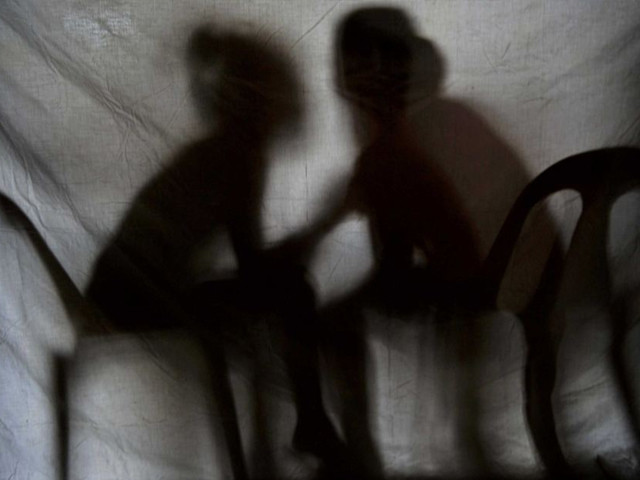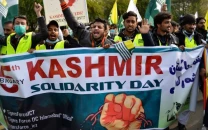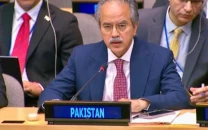For women, uptick in domestic violence remains constant
Unfettered rise of intimate partner abuse is down to a lack of sensitisation of the criminal justice system

Often classified as a family issue by law enforcement rather than a social ill, domestic violence has grown unhindered further aided by a societal taboo on airing one’s dirty laundry in public.
Despite an uptick in awareness, owing to social media campaigns by rights activists in the country, and an increase in state sponsored reporting mechanisms, domestic violence’s upsurge is down to several factors which include stringent evidentiary laws, a lack of sensitization in the justice system, and more recently pandemic-related lockdowns.
“The violence sometimes continues at the police stations. Officials violate the dignity of women who are reporting a domestic violence issue”
Hina Jillani, Chairperson HRCP.
As far as the social stigma is concerned it enables intimate partner violence, to be swept under the rug at homes and shooed away at police stations as a matter capable of reconciliation between domestic partners. However, gender policy experts believe that terming such violence as intimate or domestic is one of the reasons why there is a stigma around it in the first place. “By referring to violence as domestic or intimate we colour it as a personal problem and in turn such violence becomes exclusive and separate from collective action,” opined Zainab Najeeb, a gender policy analyst.
Read: Amber Heard says Johnny Depp sexually assaulted her in Australia while filming 'Pirates'
Zainab’s views hold weight as in Punjab, the country’s most populous province out of which nearly half of the population is women, domestic violence itself is not criminalised but rather civil remedies are given in the Punjab Protection of Women against Violence Act, 2016. Even if the Punjab law classifying such violence as a civil matter can be ignored, other provinces, where the offense is criminal have not fared better in curbing domestic violence or increasing reporting. “Women do not have any faith in the justice system, and it is difficult to report in the social environment they live in,” stated Hina Jillani, who is the Chairperson of the Human Rights Commission of Pakistan (HRCP), “some do not even have enough support or sympathy from their families to stand up for themselves.”
For instance, it took 25 years for one victim to finally seek a lawyer to take her abusive husband to court. Narrating the case of the 46-year-old victim, Khushbakht Shah, a lawyer based in Karachi, whose practice is specifically regarding domestic violence cases, said that her client had to wait till her mother had passed away just to report because the mother did not believe in going public with such problems. “So, she suffered in silence for over two decades just so that her mother would not be ashamed,” a despondent Khushbakht informed.
Countless other women, who suffer abuse, both physical and emotional, daily just to protect their loved ones from being subjected to raised eyebrows from society is the hallmark of an issue continuously being brushed off. Zainab, who is also an anthropologist, believes that domestic violence is brushed off and prevalent in the country because our understanding of romantic or familial love is very gendered and regressive as women are seen as vessels or extensions of norms and not as real adults with agency.
Emotional attachment is one of the two key reasons for victims staying in abusive relationships: the other being the fear of leaving
Khushbakht, concurs with this view, as in the domestic violence cases she has handled so far, some victims, who were visibly beaten to a pulp, questioned the need to report or file a case by stating: “It is okay if the husband beats me, he loves me unconditionally as well.”
Such emotional attachment is one of the two key reasons for victims staying in abusive relationships; the other being the fear of leaving. “Victims feel that leaving is not an option because what awaits them outside the abusive relationship could be worse,” said Tahira Javed, a clinical psychologist based in the federal capital. Tahira, while talking to the Express Tribune, elaborated that victims feel they have some semblance of control in an abusive relationship as in they can control the factors which triggers their abuser. “For instance, if the abuser does not like the victim to go out or not dress a certain way, the victim feels that by following those instructions they can minimize the abuse,” she informed.
Even minimal abuse has long lasting effects though as victims develop self-esteem issues and begin questioning whether they can even survive outside the relationship. Furthermore, their mental health deteriorates, with victims often developing complex post-traumatic stress disorder (PTSD), which in turn impacts their physical health. Tahira believes that our understanding of abuse is often limited to physical abuse which is visible, and we ignore emotional abuse. “It is nearly impossible to promote in this society that emotional abuse, which includes gaslighting and manipulation, is equally worrying as physical abuse.” Some sociologists have termed emotional abuse as intimate terrorism given the serious implications it has on a victim’s mental health and overall personality. Despite these mental health stressors, for partners who have children together, leaving becomes a near impossibility. “Victims feel that by leaving, the future of their children will be impacted,” Tahira explained, “as the societal stigma around divorce or separation follows their children as well.”
In the event that women get lucky enough that they can lodge a report, the stringent evidentiary requirements deter women from pursuing the case any further
Apart from the psychological aspect, women’s lack of financial independence deters them from escaping as well - as per the most recent data available courtesy of the World Bank modeled on International Labour Organization (ILO) estimates, only 20.6% of Pakistan’s female population is part of the country’s labor force.
Women who are financially empowered, however, run into other problems. “Many families do not prefer working wives or daughter-in-laws because they know that they have an out and do not have to rely on the man or his family for survival,” remarked Zainab. While she agrees that financial independence might serve as an escape from abuse sometimes, the gender policy analyst believes that it is not a cookie-cutter solution because domestic responsibilities are not equally shared between domestic partners. “Working women have the burden of running the household and showing up at the workplace. If she foregoes the household, it could potentially lead to emotional abuse,” she added.
Reporting barriers
Even though awareness regarding domestic violence has seen an uptick, for some women, who do take a stand and report, as per Hina Jillani, the ordeal is far from over which is a significant reason for the under-reporting of cases. “The violence sometimes continues at the police stations. Officials violate the dignity of women who are reporting a domestic violence issue,” said Hina, who is a prominent women’s right activist in the country.
In the event that women get lucky enough that they can lodge a report, for which sometimes broken bones or visibly gruesome injuries are necessary requirements in the eyes of law enforcement officials according to Hina, the stringent evidentiary requirements deter women from pursuing the case any further. “The onus of proof falls on the victim. If the mindset of the prosecution and the police is that the victim must bring witnesses and only then we will prosecute that is where women start withdrawing cases because they don’t want to be involved in such a rigorous process,” she stated.
“Statements like men cannot cry and men should be tough instill dominance in men and by doing so we teach them how to suppress their emotions instead of voicing them”
Tahira Javed, a clinical psychologist
The icing on the cake, as per Hina, is that even the proof requirements are so rigid that often the prosecution is not successful - for instance victims are often clueless as to how to bring concrete evidence for psychological abuse. If by some Herculean effort, the victim does survive the initial hurdles, their hope is broken by weak protection laws. “The state cannot grant appropriate physical or social protection to women who report domestic violence. The shelter homes, which are supposed to be safe havens for victims who are often alone and afraid, are so dilapidated that women are afraid of going to them. Hence, they get discouraged,” said Hina in a no holds barred interview.
Read More: At least 3,852 children sexually abused in 2021, report reveals
Therefore, in Hina’s experience, after a victim reports the matter, it typically gets resolved within the family. “However, such reconciliation is not sustainable for the victim,” she said.
A sustainable solution
Tahira, who has been working as a psychologist for over two decades, says that the solution lies in understanding what elements of the society make an abuser in the first place. “Statements like men cannot cry and men should be tough instill dominance in men and by doing so we teach them how to suppress their emotions instead of voicing them,” she informed, “so when they finally break from suppressing their emotions and lash out, it is usually physical violence they opt for.”
Identification of an abuser is one element, Hina suggests that the other side of the coin is that to make existing gender-based violence mechanisms effective, resources should be put behind them. “Currently, there is no serious social policy backing the law, the government has different priorities,” she opined.
Khushbakht, who practices in Karachi, agreeing with Hina’s assessment said that the government does not do enough to create awareness about existing domestic violence laws and that there is a lack of budget allocation for creating such awareness in the first place.
Budget constraints also follow into the police stations, which shoo away victims because they want to allocate resources to higher-profile cases, as per Hassan Hakeem, who is the Technical Advisor at the Women’s Parliamentary Caucus. The constraints further translate into a lack of gender sensitivity training and sensitization to domestic violence as a social ill.
“Sensitisation is also an issue because women police officers are about 1% or less than 1% of the total workforce,” said Hassan. Representation of women in law enforcement matters as last year when the Chitral Police established a women’s desk at the police stations and appointed a female officer, the town in Khyber Pakhtunkhwa (K-P), which had a persistent female suicide problem due to domestic violence, saw a remarkable decline once the town’s female residents could confide to the officer in charge of the women’s desk.
However, Hina, the Chairperson of the HRCP, remains skeptical whether having more women in the criminal justice system will work. “Having women in the justice system is not enough as we have had women judges who were not sensitized to the issue. Judges and prosecutors have recently been sensitized to recognize instances of emotional abuse, but you cannot counter their personal thought process by just giving trainings,” Hina explained, “the situation in higher courts has improved slightly but if you are focusing on improving domestic violence reporting but not improving the criminal justice system then all your efforts will be in vain.”
In Hina’s view, the truly sustainable solution is that there should be accountability for all cogs in the justice system. She believes that police officers should be aware of the consequences they will face if they mishandle domestic violence cases and misguide victims. When asked if she sees any hope for the near future, Hina stated: “There has been some progress as provinces have established women protection authorities. Lahore even has a court specifically for domestic violence cases, which the government said would be made in other cities as well but so far nothing has been done. We still have a long way to go.”



















COMMENTS
Comments are moderated and generally will be posted if they are on-topic and not abusive.
For more information, please see our Comments FAQ